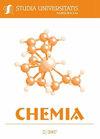Tracking the growing rings in biogenic aragonite from fish otolith using confocal Raman microspectroscopy and imaging
IF 0.5
4区 化学
Q4 CHEMISTRY, MULTIDISCIPLINARY
引用次数: 1
Abstract
Fish otoliths pose increasing interest due to their potential of rendering information about environmental changes, underlined in their non-linear time-dependent biogenic crystal growth. Otoliths are acellular, metabolically inert and continuously grow in a complex process which still needs to be understood. In the present work confocal Raman microspectroscopy (CRM) and imaging is employed to investigate the growth pattern in otoliths from Sparus aurata of Mediterranean provenance. CRM signal acquired from otolith sagittal section is exploited to associate it with the periodic growth increments denoted as rings. Raman signal collected from the core to the margins with micrometer spatial resolution invariably revealed characteristic signal of aragonite. Relative intensity variability was observed particularly for the lattice modes, indicating changes in crystalline orientation relative to incident laser. Bands associated with organic fraction were absent in the 90-1840 cm-1 spectral range. Daily growth rings were further studied using the Raman mapping of main aragonite bands intensities at 1083, 704 and the lattice modes in the 100-350 cm-1 range. The spectral intensity pattern closely follows the daily growth pattern. Traces of toxic or heavy metals incorporated in biogenic carbonate mineral were spuriously detected in the mapped areas, according to the position and width of the Raman bands of witherite (BaCO3), strontianite (SrCO3), along with the main aragonite and trace of its calcite polymorph.用共聚焦拉曼显微光谱和成像技术跟踪鱼耳石中生物文石的生长年轮
鱼类耳石由于其具有提供环境变化信息的潜力而引起越来越多的关注,特别是其非线性的随时间变化的生物晶体生长。耳石是无细胞的,代谢惰性的,在一个复杂的过程中不断生长,这个过程仍然需要理解。本文采用共聚焦拉曼显微光谱(CRM)和成像技术研究了地中海种源光斑Sparus aurata耳石的生长模式。利用从耳石矢状面切片获得的CRM信号将其与以环表示的周期性增长增量相关联。以微米级空间分辨率从岩心到边缘采集的拉曼信号无一不显示文石的特征信号。相对强度的变化被观察到,特别是对于晶格模式,表明晶体取向的变化相对于入射激光。90 ~ 1840 cm-1光谱范围内不存在有机组分相关波段。利用主要文石带强度在1083、704和晶格模式在100-350 cm-1范围内的拉曼映射进一步研究了日生长环。光谱强度模式与日生长模式密切相关。根据软辉石(BaCO3)、强锰矿(SrCO3)拉曼带的位置和宽度,以及主要文石及其方解石多晶体的痕迹,在作图区域伪造地检测到生物碳酸盐矿物中含有的有毒或重金属的痕迹。
本文章由计算机程序翻译,如有差异,请以英文原文为准。
求助全文
约1分钟内获得全文
求助全文
来源期刊
CiteScore
0.80
自引率
33.30%
发文量
25
审稿时长
>12 weeks
期刊介绍:
Studia Universitatis Babes-Bolyai, Seria Chemia publishes fundamental studies in all areas of chemistry and chemical engineering.
Coverage includes experimental and theoretical reports on quantitative studies of structure and thermodynamics, kinetics, mechanisms of reactions, inorganic, organic, organometallic chemistry, biochemistry, computational chemistry, solid-state phenomena, surface chemistry, chemical technology and environmental chemistry.

 求助内容:
求助内容: 应助结果提醒方式:
应助结果提醒方式:


